The demand from farmers for contractors offering a mobile plunge dipping service has increased significantly in the last 12 to 24 months. The industry is responding to this demand, with the number of contractors offering a mobile plunge dipping service increasing from a handful of operators a couple of years ago to at least 16 at present. There are also reports of a number of new units being constructed.
Table 1 details the name of operators who are currently offering a service. There may be more operators we do not know about on the island of Ireland and, if this is the case, will update the list. The majority of those listed in Table 1 are operating a trailed unit, whereby sheep are manually entered into a tub or bath.
There are three automatic cage units, where sheep enter into a cage which is then hydraulically lowered into the dipping tub. Kevin Sheridan, who is located in Meath, is operating a trailed cage unit for use in larger flocks and a traditional manual unit that he typically uses for smaller flocks due to a lower volume of dip being required to fill the tub.
Tagline Mobile Sheep Dipping introduced the first truck unit on to the island of Ireland in recent years and is combining a dipping service with electronic identification to generate a print-out of animals that have been dipped.
They have been joined in the last few weeks by another truck unit, constructed in Ireland by O’Hara Engineering in Co Carlow. The unit is called the ‘O’Hara Mobi-Dip’ and its manufacturer Frank O’Hara says it is the only unit in Europe using a conveyor to feed sheep into the cage for dipping.
Growth in demand
There are a number of factors driving the resurgence in sheep dipping and, in particular, demand for those operating a mobile dipping service. There is no doubting the benefits of dipping sheep, but it is labour intensive nature and the attractiveness of alternative products for controlling external parasites has led to a sharp decline in the number of farmers practicing dipping.
Anecdotal reports from the relevant industry personnel also point to an increase in flocks reporting issues with lice or ticks due to higher than average temperatures and a continued increase in the spread of sheep scab
The increasing age profile of sheep farmers has also not helped. Many contractors operating a mobile service say that it is not uncommon for them to drive into a yard and set up adjacent to a handling unit that already possesses a dipping tub. Utilising the services of the contractor brings experienced help on to the farm, which otherwise may not be possible.
Anecdotal reports from the relevant industry personnel also point to an increase in flocks reporting issues with lice or ticks due to higher than average temperatures and a continued increase in the spread of sheep scab. With no alternative products available to deal with these ailments in one treatment, farmers are returning to dipping to achieve at least one good clear-out per year of all external parasites.
There is also a much stronger recommendation coming from relevant industry bodies about the need to revert to dipping as the main control option, for sheep scab, at least.
This follows issues with the use of injectable products from the 3-ML (macrocyclic lactones) anthelmintic class, which is used to treat sheep scab. The first of these is sheep scab resistance worryingly being identified to macrocyclic lactones in Wales a few years back, while a major concern for the Irish and UK sheep sectors is the rate at which worms are developing anthelmintic resistance.
There is also a much stronger recommendation coming from relevant industry bodies about the need to revert to dipping as the main control option
The use of macrocyclic lactones (ivermectin, doramectin and moxidectin) to treat for sheep scab is often unnecessarily treating sheep for worms, which in turn is raising resistance concerns.
The threat is such that Teagasc launched a sustainable worm control initiative earlier this year, which recommends avoiding the use of injectable products for controlling external parasites.
Veterinary recommendations
The veterinary profession has also been much more vocal in recent years, citing concerns about the use of sheep shower units or jetters. There are no dipping products currently licensed for use in these units.
While Dr Peter Bates, who is a specialist in external parasite control, has previously stated there are no guidelines available pertaining to the initial dilution and replenishment rate, he says it is also unclear if the insecticide will penetrate through the fleece and reach the skin. Furthermore, he says scab mites or lice could be present in the inner ears and only full immersion in the wash will address this.
It is vital that mobile plunge dipping operators undertake a satisfactory service in terms of diluting and replenishing the batch as recommended and maintaining sheep in the wash for at least 60 seconds.
Research by Dr Bates has shown that where sheep spend only 20 seconds in the wash, there will be 50% less than the required chemical absorbed. This remains high, at 38% of chemical not absorbed, where sheep spend 40 seconds in the wash.
Read more
Watch: live dipping demo to take place at Tullamore Farm open day
First showing for hydraulic cage plunge dippers
Dipping sets ewes up for breeding on Tullamore Farm
The demand from farmers for contractors offering a mobile plunge dipping service has increased significantly in the last 12 to 24 months. The industry is responding to this demand, with the number of contractors offering a mobile plunge dipping service increasing from a handful of operators a couple of years ago to at least 16 at present. There are also reports of a number of new units being constructed.
Table 1 details the name of operators who are currently offering a service. There may be more operators we do not know about on the island of Ireland and, if this is the case, will update the list. The majority of those listed in Table 1 are operating a trailed unit, whereby sheep are manually entered into a tub or bath.
There are three automatic cage units, where sheep enter into a cage which is then hydraulically lowered into the dipping tub. Kevin Sheridan, who is located in Meath, is operating a trailed cage unit for use in larger flocks and a traditional manual unit that he typically uses for smaller flocks due to a lower volume of dip being required to fill the tub.
Tagline Mobile Sheep Dipping introduced the first truck unit on to the island of Ireland in recent years and is combining a dipping service with electronic identification to generate a print-out of animals that have been dipped.
They have been joined in the last few weeks by another truck unit, constructed in Ireland by O’Hara Engineering in Co Carlow. The unit is called the ‘O’Hara Mobi-Dip’ and its manufacturer Frank O’Hara says it is the only unit in Europe using a conveyor to feed sheep into the cage for dipping.
Growth in demand
There are a number of factors driving the resurgence in sheep dipping and, in particular, demand for those operating a mobile dipping service. There is no doubting the benefits of dipping sheep, but it is labour intensive nature and the attractiveness of alternative products for controlling external parasites has led to a sharp decline in the number of farmers practicing dipping.
Anecdotal reports from the relevant industry personnel also point to an increase in flocks reporting issues with lice or ticks due to higher than average temperatures and a continued increase in the spread of sheep scab
The increasing age profile of sheep farmers has also not helped. Many contractors operating a mobile service say that it is not uncommon for them to drive into a yard and set up adjacent to a handling unit that already possesses a dipping tub. Utilising the services of the contractor brings experienced help on to the farm, which otherwise may not be possible.
Anecdotal reports from the relevant industry personnel also point to an increase in flocks reporting issues with lice or ticks due to higher than average temperatures and a continued increase in the spread of sheep scab. With no alternative products available to deal with these ailments in one treatment, farmers are returning to dipping to achieve at least one good clear-out per year of all external parasites.
There is also a much stronger recommendation coming from relevant industry bodies about the need to revert to dipping as the main control option, for sheep scab, at least.
This follows issues with the use of injectable products from the 3-ML (macrocyclic lactones) anthelmintic class, which is used to treat sheep scab. The first of these is sheep scab resistance worryingly being identified to macrocyclic lactones in Wales a few years back, while a major concern for the Irish and UK sheep sectors is the rate at which worms are developing anthelmintic resistance.
There is also a much stronger recommendation coming from relevant industry bodies about the need to revert to dipping as the main control option
The use of macrocyclic lactones (ivermectin, doramectin and moxidectin) to treat for sheep scab is often unnecessarily treating sheep for worms, which in turn is raising resistance concerns.
The threat is such that Teagasc launched a sustainable worm control initiative earlier this year, which recommends avoiding the use of injectable products for controlling external parasites.
Veterinary recommendations
The veterinary profession has also been much more vocal in recent years, citing concerns about the use of sheep shower units or jetters. There are no dipping products currently licensed for use in these units.
While Dr Peter Bates, who is a specialist in external parasite control, has previously stated there are no guidelines available pertaining to the initial dilution and replenishment rate, he says it is also unclear if the insecticide will penetrate through the fleece and reach the skin. Furthermore, he says scab mites or lice could be present in the inner ears and only full immersion in the wash will address this.
It is vital that mobile plunge dipping operators undertake a satisfactory service in terms of diluting and replenishing the batch as recommended and maintaining sheep in the wash for at least 60 seconds.
Research by Dr Bates has shown that where sheep spend only 20 seconds in the wash, there will be 50% less than the required chemical absorbed. This remains high, at 38% of chemical not absorbed, where sheep spend 40 seconds in the wash.
Read more
Watch: live dipping demo to take place at Tullamore Farm open day
First showing for hydraulic cage plunge dippers
Dipping sets ewes up for breeding on Tullamore Farm



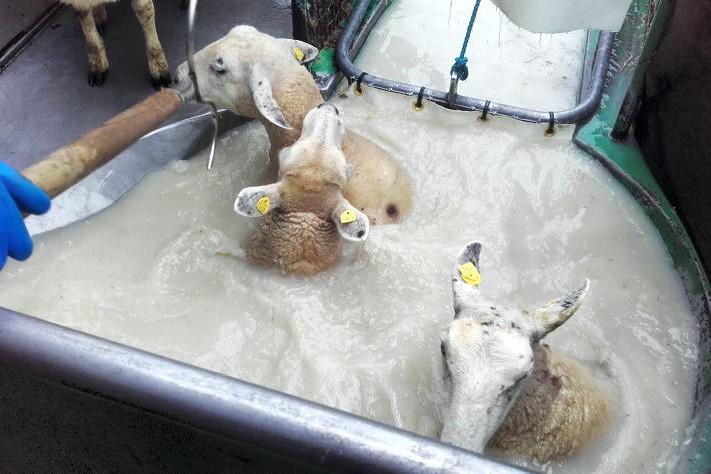

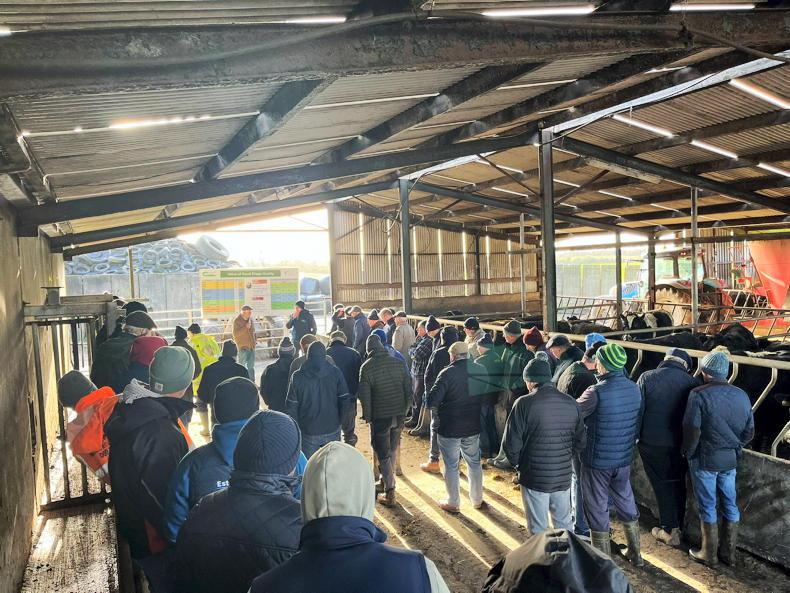

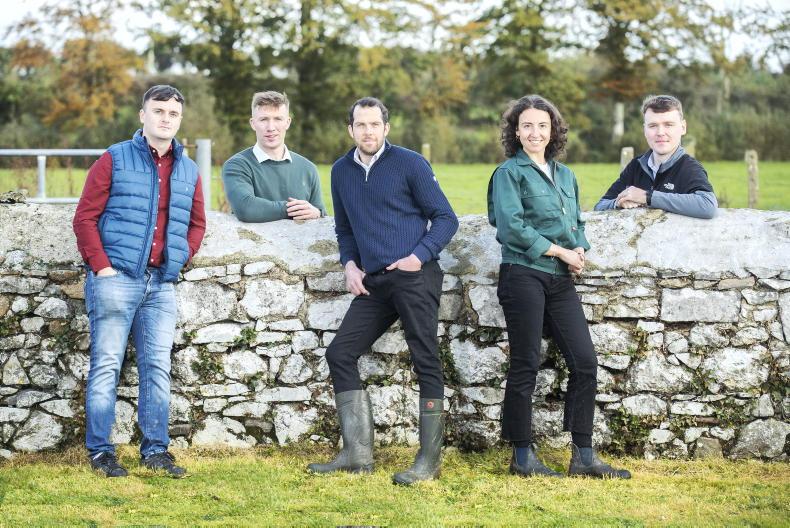
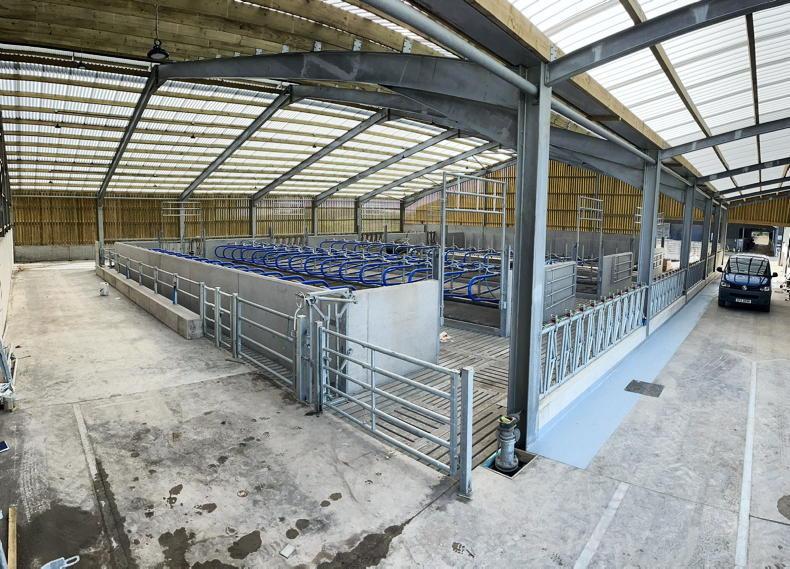
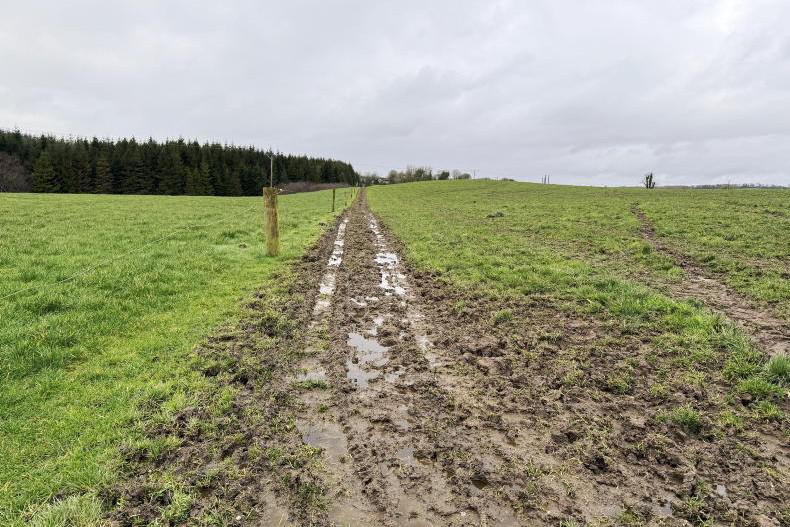
SHARING OPTIONS